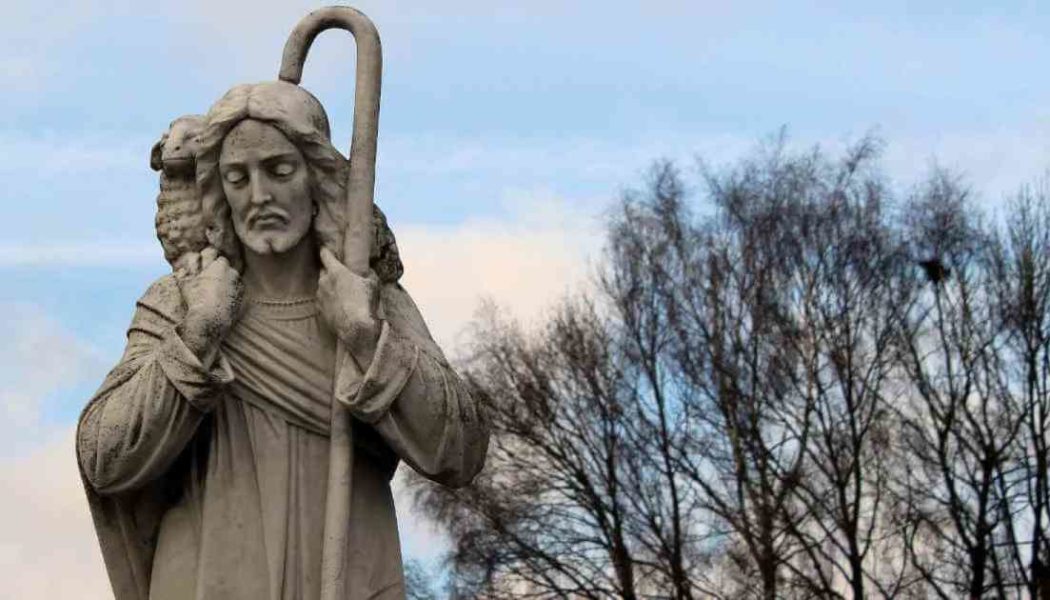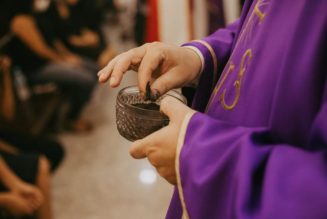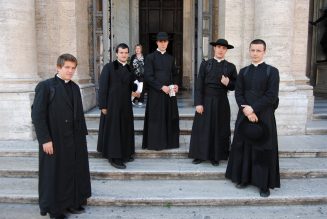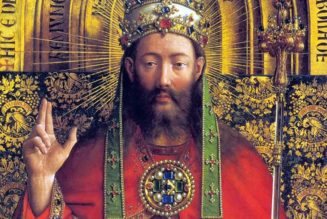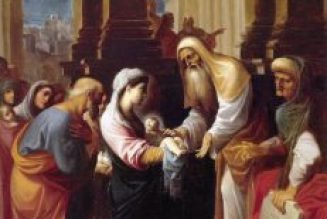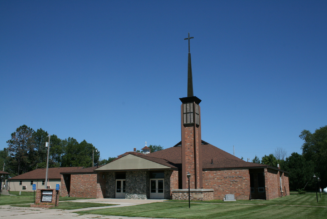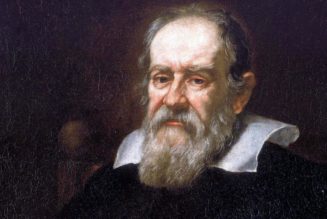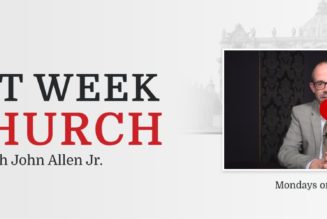
Don’t think that Jesus is only saying sweet consoling words when he proclaims himself the good shepherd on the Fourth Sunday of Easter, Year B.
He is, certainly, doing that. But he is also saying something uniquely challenging.
What he said about the Good Shepherd almost got him killed.
The Gospel we hear on Good Shepherd Sunday is the climax of a three-chapter-long confrontation in the Gospel of John between Jesus and Jewish leaders.
It starts with Jesus teaching in the Temple during the Feast of Tabernacles and in the course of the showdown, he compares himself to “living waters” and calls himself “the light of the world.” He twice references his own divinity saying, “Before Abraham was, I am,” and “I and the Father are one.”
He doesn’t just teach astonishing things, he does astonishing things: He takes the confrontation about the woman caught in adultery and turns it against the Jewish leaders, and he heals a man born blind in a way that infuriates the authorities.
It all comes to a head as Chapter 10 begins, and Jesus explains to the Jewish leaders who he is, in the words of today’s Gospel: “I am the Good Shepherd.”
When Jesus says he’s the good shepherd, we picture the smiling shepherd that leaves the 99 behind and brings the one back on his shoulders, rejoicing. That’s not what the Jewish leaders pictured. They pictured God himself coming to shepherd his people, the way it was described by the prophet Ezekiel — one of the three great prophets, along with Isaiah and Jeremiah.
Jesus wasn’t calling himself a friendly farmhand — he was saying he is God himself arriving at the end of days to gather the nations to himself.
This challenges them for three reasons. It should challenge us in the same ways.
First, Jesus describes himself as the true friend of the people, and other leaders as imposters.
He says:
“I am the good shepherd. A good shepherd lays down his life for the sheep. A hired man, who is not a shepherd and whose sheep are not his own, sees a wolf coming and leaves the sheep and runs away and the wolf comes and scatters them.”
In that, the Jewish leaders heard strong echoes of Ezekiel saying “Woe to the shepherds of Israel” for ignoring the sheep such that “they were scattered for lack of a shepherd and became food for all the wild beasts.”
We should also take the cue that we shouldn’t give ourselves to leaders other than Christ; political leaders, corporate leaders, and cultural leaders will only disappoint us.
Second, he makes himself God.
Jesus says:
“I am the good shepherd, and I know mine and mine know me, just as the Father knows me and I know the Father, and I will lay down my life for the sheep.”
In fact, as the Jewish leaders knew from Ezekiel, God didn’t just promise a new human shepherd. He said, “I myself will pasture my sheep.” Jesus was somehow claiming that he was God himself arriving at last.
That has dramatic consequences in our lives also. If Jesus and the Father are one, and we are meant to know Jesus as the Father knows the Son, then Jesus — the God-man who died for us — has to take the very first place in our life, pushing other considerations aside.
Third, Jesus made himself their judge.
In addition to calling the Temple leaders “thieves and robbers” Jesus said:
“I have other sheep that do not belong to this fold. These also I must lead, and they will hear my voice and there will be one flock, one shepherd.”
The Jewish leaders knew that God’s plan for salvation had never entirely excluded all non-Jewish people. It included people as varied as the righteous Job and the prostitute Rahab; it included both the widow of Sidon and the Syrian commander Naaman — and it stretched all the way from proto-priest Melchizedek to King Cyrus at the end of the exile.
But Isaiah, Jeremiah and Ezekiel spoke of a New Covenant coming, when the kingdom would be opened up to all the nations. And now, Jesus was proclaiming a new Church, a “light to the nations,” or Lumen Gentium, as Vatican II spells it out.
Catholics today have to be open as well, to phenomena such as the Asbury University revival in Kentucky, and the remarkable work of many Protestant missionaries, seeing Jesus working in the lives of people from many starting points, drawing us into his one flock.
In the end, we won’t be welcomed into Christ’s company because we are in with the right crowd — believing Catholics who don’t dissent. We will be welcomed into his company because we know him. It is knowing him that makes us believing Catholics who don’t dissent, not the other way around.
In Acts, Peter follows Christ’s example very well — as does Francis in the latest Vatican Declaration.
Ever since Easter, Sunday readings have been applying Jesus’s lessons to the Easter life primarily through the examples of Peter and John. Today, the First Reading presents Peter proclaiming Christ boldly to the Jewish leaders much as Jesus did. He also heals like Jesus did. The “good deed done to a cripple,” he mentions is Peter’s healing of a lame beggar at the Temple gate.
Peter even makes Jesus their judge, and the judge of all humanity, saying that “there is no salvation through anyone else, nor is there any other name under heaven given to the human race by which we are to be saved.”
The successors of Peter have continued in the same line ever since, up to and including Pope Francis. In Dignitas Infinita the Church is the friend and defender of all human beings “created by God and redeemed by Christ,” denouncing everything from poverty, war and human trafficking to abortion, gender theory and online exploitation.
Peter faced the opposition of his day like Jesus did, and in the new Declaration, Francis is facing it like Peter.
John complements Peter perfectly, adding love to truth — and is a model for how we should complement Pope Francis.
Peter preaches love, but the Petrine office has to focus on doctrinal distinctions. John preaches love, and the Johannine community witnesses love more mystically and personally.
“Beloved, we are God’s children now,” John says. “See what love the Father has bestowed on us that we may be called the children of God. Yet so we are. The reason the world does not know us is that it did not know him,” he says.
Those who live in the love of Christ will find, in the age to come, that “we shall be like him, for we shall see him as he is,” John says.
So will we if we love our neighbors in the 21st century with real dedication while refusing to compromise their infinite dignity. When we insist on truth without love, we create a power struggle where the teachings of the Church compete against the powers that be, and we lose the battle. When we love without insisting on truth, we end up affirming the falsehoods of the world and we surrender the battle. When we insist on hard truths while embracing others we join Christ’s work and prevail.
This is why Jesus is a Good Shepherd: To draw us into his way not from a distance, but from right by our side.
After all the Old Testament allusions are understood, we can still look back at that image of the smiling shepherd with the sheep over his shoulders, rejoicing that he found us.
Think about how much the judge from Ezekiel loves us: Just as shepherds have to live like sheep, our Divine Shepherd chose to live like us.
An ancient shepherd dedicated his life to his sheep such that their lifestyles merged: Shepherds would sleep outside, like those at Bethlehem did. Shepherds sought out the hills that most benefit the sheep — when a shepherd looks at two fields, he doesn’t say, “Which one would I prefer?” he says, “Which one would my sheep prefer?
A shepherd becomes an expert in his sheep and the sheep become experts in the shepherd.
The sheep know when the Shepherd will come in the morning. They learn the sound of his voice, the rhythm of his footfalls and the way he clears his throat. They learn what to expect from the shepherd when they get out of line. They also learn to distinguish the shepherd’s voice from another shepherd’s. They will respond only to the one they know.
This is how Jesus lives with us and how we should live with him.
Jesus says, “I know mine and mine know me, just as the Father knows me and I know the Father; and I will lay down my life for the sheep.”
When we hear the priest say “Behold the Lamb of God” at Mass and go forward to be united with the shepherd who first united himself with us, we can pray with the words to the song: “Perverse and foolish oft I strayed, But yet in love he sought me, And on his shoulder gently laid, And home, rejoicing, brought me.”
Photo: Pickpik
